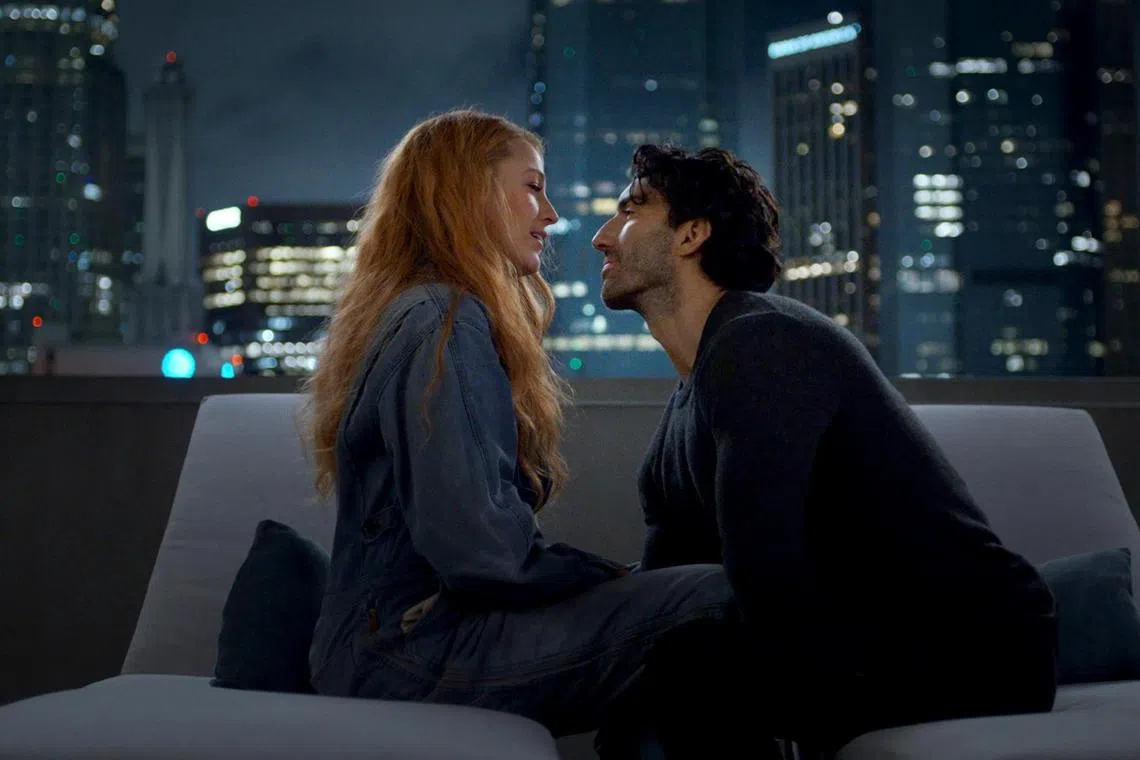Judge seeks to limit lawyer commentary on Blake Lively-Justin Baldoni suits
Sign up now: Get ST's newsletters delivered to your inbox

Blake Lively (left) and Justin Baldoni in It Ends With Us.
PHOTO: SONY PICTURES
NEW YORK – A federal judge, weighing in for the first time in duelling lawsuits between Blake Lively and Justin Baldoni,
At a hearing in United States District Court in Manhattan, a lawyer for the American actress objected to what he called “inflammatory” comments by Mr Bryan Freedman, an attorney for American actor Baldoni, as he contests her allegations of sexual harassment and retaliation surrounding their movie It Ends With Us (2024).
Since Lively came forward in December with claims against Baldoni – who directed the movie and starred in it with Lively – Mr Freedman has done media interviews and provided statements disputing her accusations that she was the victim of harassment and then a smear campaign.
At the hearing, a lawyer for Lively, Mr Michael Gottlieb, said Mr Freedman had unfairly attacked the actress’ character – including by accusing her of bullying behaviour – warning that his statements threatened to taint the pool of potential jurors for an eventual trial.
“You’re not supposed to launch attacks on the other party’s character,” Mr Gottlieb said.
Lawyers for Baldoni have countered that Mr Freedman’s comments have followed ethics rules and were made in response to a “media feeding frenzy” started by Lively.
Mr Freedman also read aloud statements from Lively’s legal team, including one that described Baldoni’s lawsuit as employing a strategy associated with harassment called Darvo, which stands for “deny, attack and reverse victim and offender”.
“This has not been a one-way street,” Mr Freedman said at the hearing.
The conflict between the two high-profile stars has become a fixation for Hollywood, tabloids and social media in recent weeks. The legal dispute also includes a producer, public relations executives and journalists.
Presiding over a courtroom full of journalists and lawyers for the various parties, Judge Lewis Liman of US District Court in Manhattan ordered that the attorneys abide by a New York rule that aims to prevent a lawyer from making public statements outside court that have a “substantial likelihood of materially prejudicing” the proceedings.
Judge Liman noted that the court documents laying out the actors’ claims gave “the public plenty to feast upon”. But ultimately, he said, the battle over whose narrative of events is correct will play out in court.
“There will come a time, unless this case is settled, that a jury will speak,” the judge said.
Neither Lively, 37, nor Baldoni, 41, attended the hearing on Feb 3.
In recent days, the public has been parsing footage of a scene at issue in Lively’s lawsuit that was released to news outlets alongside a statement from Mr Freedman. Baldoni’s team also published a website where users can download public court documents that contain dozens of pages of communications related to the production of the film.
The lawsuits filed by the actors have presented differing accounts of what happened on the set of It Ends With Us, an adaptation of American author Colleen Hoover’s 2016 novel about a woman’s escape from domestic abuse. In the film, Lively plays the heroine, and Baldoni portrays her abusive partner.
Defendants in Lively’s lawsuit include Baldoni, who is a founder of Wayfarer Studios, a company that produced the film, as well as Mr Jamey Heath, Wayfarer’s chief executive, along with a public relations team.
The hearing was the first time that lawyers for the actors have appeared in court since the legal dispute began on Dec 20, when Lively filed a complaint with the California Civil Rights Department against Baldoni and others on his team.
A day later, The New York Times reported on her accusations, quoting excerpts from text messages, emails and other documents related to the case.
Baldoni has sued the Times for libel, asserting that the article deliberately omitted portions of text exchanges and other information that contradicted the actress’ version of events. That suit was initially filed in California, but on Jan 31, he added the Times as a defendant in his suit against Lively in New York.
The Times has said in a statement that it plans to “vigorously defend against the lawsuit”, calling the article “meticulously and responsibly reported”. NYTIMES


